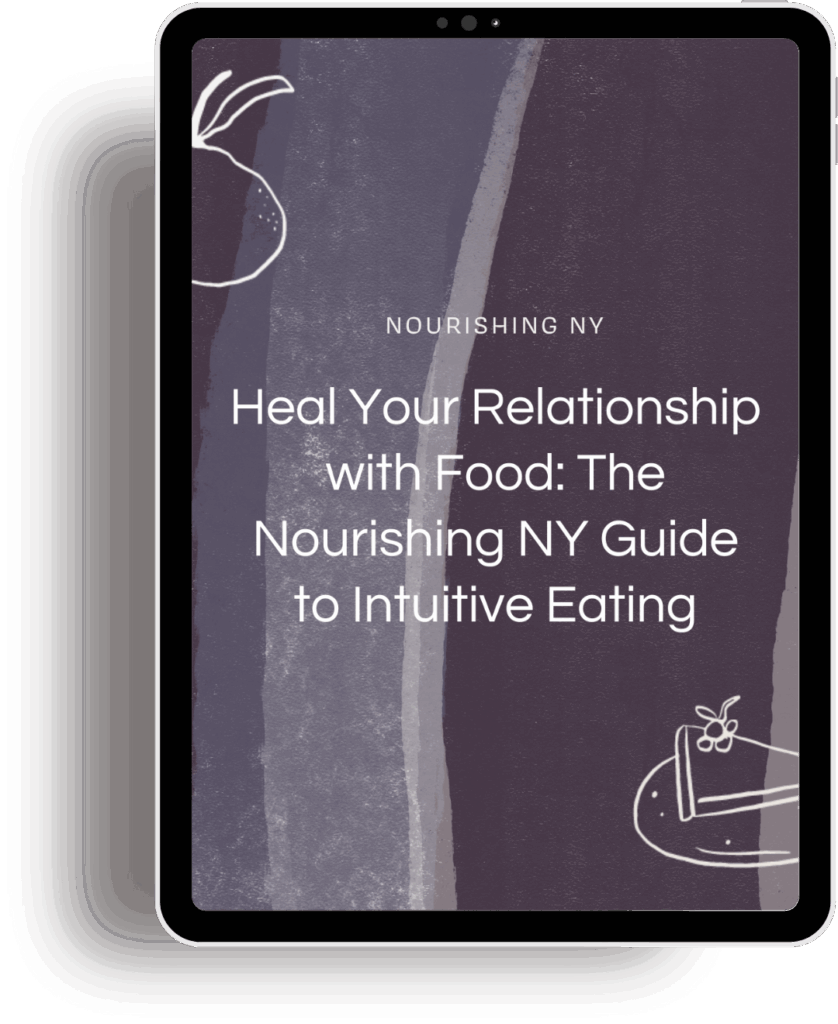Introduction:
When seeking support for eating disorder treatment, a Registered Dietitian can be an integral part of the clinical team. They provide evidence-based nutrition therapy and medical nutrition therapy to ensure proper nutrient intake.
However, oftentimes, the titles “Registered Dietitian” and “Nutritionist” are used interchangeably, but they represent different levels of expertise, credentialing, and regulatory oversight. It is imperative to understand the differences between these titles in order to make an informed decision about your care.
Exploring Registered Dietitians (RDs) at Nourishing NY:
A Registered Dietitian (RD) or Registered Dietitian Nutritionist (RDN) is required to meet stringent requirements in order to become accredited through the Commission on Dietetic Registration. The steps to become a Registered Dietitian are as follows:
-
Earn a minimum of a graduate degree from a Didactic Program in Dietetics, which includes the necessary course prerequisites for dietetics practice. While a master’s degree is now required to sit for the RDN examination, many will obtain a bachelor’s degree and pursue a graduate degree in another related field.
-
Complete at least 1,000 hours of supervised practice under a dietitian as part of a dietetic internship. To gain experience and apply classroom knowledge, one will complete rotations in various settings, such as hospitals, food service management, community health, private practice, etc.
-
Pass a national examination administered by the Commision on Dietetic Registration (CDR).
-
Obtaining state licensure, depending on one’s state’s regulations and requirements.
-
Maintain credentials by completing continuing education credits via training, workshops, and participation in professional organizations.
Nutritionist Education and Credentials:
A nutritionist is not required to receive any formal training, and they may have a degree in a nutrition-related field (i.e. Public Health), but this is not necessarily required. Nutritionists are not required to complete supervised hours, nor are they required to pass a formal examination. The title “Nutritionist” is protected in some places, but the regulation varies across states, allowing anyone to call themselves a “nutritionist.”
Individuals may choose to pursue various paths to becoming a nutritionist via formal education, certification programs (i.e. Certified Nutrition Specialist), online courses or online certificate programs, and independent learning, workshops, or seminars.
Nutritionists are also able to hold advanced degrees, such as a Master of Science (MS) in Nutrition, a Master of Public Health (MPH) with a concentration in Nutrition, a Master of Science (MS) in Food Science, and a Master of Clinical Nutrition (MCN). A nutritionist may also pursue the certification of Certified Nutrition Specialist (CNS), which emphasizes clinical nutrition and functional medicine. However, unlike the title of Registered Dietitian, “Nutritionist” is not regulated.
At Nourishing NY, our team is made up of exclusively Registered Dietitians, with highly qualified education backgrounds and experience. We are leading experts in the treatment of eating disorders and offer evidence-based nutrition therapy to all of our clients.
Scope of Practice at Nourishing NY:
Given the extensive education requirements necessary to obtain the Registered Dietitian credential, the scope of practice is equally extensive. In the context of eating disorders, RDs are able to provide Medical Nutrition Therapy, which involves diagnosing nutrition-related problems, assess nutritional status, and implement appropriate nutrition interventions. Additionally, they are able to address the psychological aspects of eating disorders and integrate nutrition counseling as part of their intervention. RDs monitor a client’s progress through biochemical parameters, vitals, nutrient intake, meal plan compliance, overall mental health, and care coordination with the interdisciplinary team.
Nutritionists are able to provide general advice on one’s nutrient intake and health, but they may lack the comprehensive understanding and training necessary for eating disorder treatment. They may also be limited in their ability to provide Medical Nutrition Therapy or make clinical judgements about the client’s care. Nutritionists more primarily work in non-clinical areas (i.e. gyms, wellness centers, schools). While some nutritionists may have specialized training in eating disorders, they would most likely work under the supervision of another RD or healthcare clinician with more advanced training and experience. Overall, Nutritionists tend to provide more general nutrition education, while Registered Dietitians are able to provide a more specialized set of treatment modalities.
Collaboration and Integration at Nourishing NY:
As previously mentioned, working with a Registered Dietitian at Nourishing NY can be extremely advantageous in one’s eating disorder recovery, especially given the medical complexities and nuances associated with eating disorders. Our Registered Dietitians provide a comprehensive, evidence-based approach to nutrition, and offer individualized care to best support one’s recovery journey. They provide nutrition education, collaborative meal plans, techniques for mindful and intuitive eating, support in building a healthy relationship with food, and coordination of care with other members of the treatment team.
Making Informed Choices
When seeking out nutrition-related services, it is important to understand the differences between Registered Dietitians and Nutritionists to ensure that you receive the appropriate care and find the right fit for your needs. Some helpful tips in finding a Registered Dietitian include:
-
Look for the “RD” or “RDN” (Registered Dietitian Nutritionist) credential.
-
Verify that they have received their bachelor’s or master’s degree from an accredited program.
-
Review previous job experience.
-
Utilize an eating disorder organization such as the National Eating Disorder Association , Project Heal , International Federation of Eating Disorder Dietitians, or ANAD (National Association of Anorexia Nervosa and Associated Disorders) to search for eating disorder registered dietitians.
Nutritionists may have titles such as “health coach,” “nutrition consultant,” or “nutrition therapist.” Reviewing a nutritionist’s credentials, academic background, and job experience is also highly recommended.
Ready to start your healing journey with one of our Registered Dietitians here at Nourishing NY?



